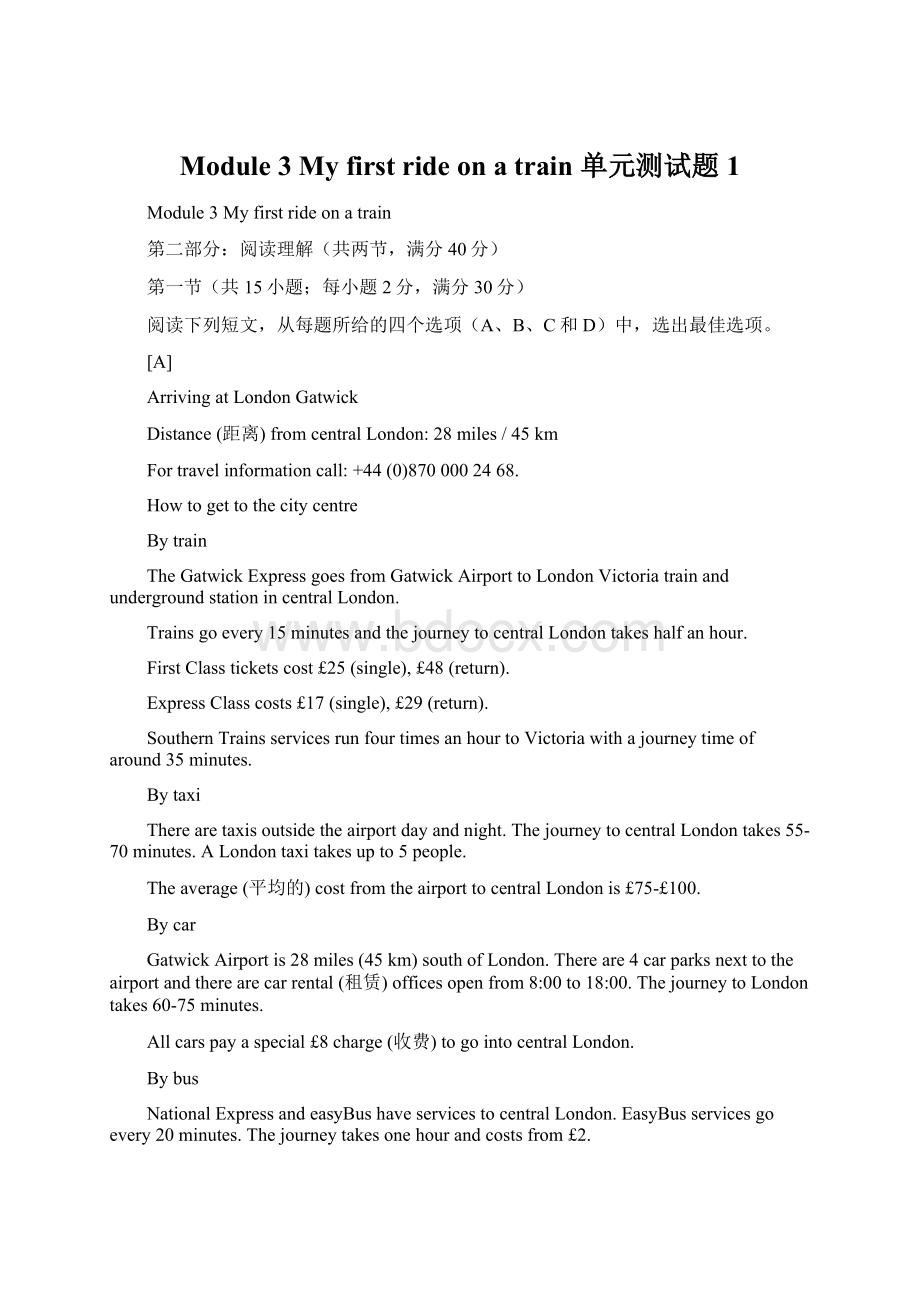Module 3 My first ride on a train 单元测试题 1.docx
《Module 3 My first ride on a train 单元测试题 1.docx》由会员分享,可在线阅读,更多相关《Module 3 My first ride on a train 单元测试题 1.docx(16页珍藏版)》请在冰豆网上搜索。

Module3Myfirstrideonatrain单元测试题1
Module3Myfirstrideonatrain
第二部分:
阅读理解(共两节,满分40分)
第一节(共15小题;每小题2分,满分30分)
阅读下列短文,从每题所给的四个选项(A、B、C和D)中,选出最佳选项。
[A]
ArrivingatLondonGatwick
Distance(距离)fromcentralLondon:
28miles/45km
Fortravelinformationcall:
+44(0)8700002468.
Howtogettothecitycentre
Bytrain
TheGatwickExpressgoesfromGatwickAirporttoLondonVictoriatrainandundergroundstationincentralLondon.
Trainsgoevery15minutesandthejourneytocentralLondontakeshalfanhour.
FirstClassticketscost£25(single),£48(return).
ExpressClasscosts£17(single),£29(return).
SouthernTrainsservicesrunfourtimesanhourtoVictoriawithajourneytimeofaround35minutes.
Bytaxi
Therearetaxisoutsidetheairportdayandnight.ThejourneytocentralLondontakes55-70minutes.ALondontaxitakesupto5people.
Theaverage(平均的)costfromtheairporttocentralLondonis£75-£100.
Bycar
GatwickAirportis28miles(45km)southofLondon.Thereare4carparksnexttotheairportandtherearecarrental(租赁)officesopenfrom8:
00to18:
00.ThejourneytoLondontakes60-75minutes.
Allcarspayaspecial£8charge(收费)togointocentralLondon.
Bybus
NationalExpressandeasyBushaveservicestocentralLondon.EasyBusservicesgoevery20minutes.Thejourneytakesonehourandcostsfrom£2.
ThereisoneNationalExpressbusanhour.Thejourneytakes90minutesandcosts£7.60.
21.SomeoneinahurrytoVictoriastationhadbettertravel_____.
A.bytrain
B.bycar
C.bytaxi
D.bybus
22.Whatdoestravelingbytaxiandcarhaveincommon?
A.Theycostthesame.
B.They'reavailableatanytime.
C.Theyrequireaspecial£8charge.
D.Theytakeasimilarperiodoftime.
23.Whichofthefollowinggoesthreetimesanhour?
A.GatwickExpress.
B.NationalExpress.
C.EasyBus.
D.SouthernTrains.
24.Whereisthetextprobablytakenfrom?
A.Ashortnotice.
B.Atravelguide.
C.Acityintroduction.
D.ATVadvertisement.
[B]
EricDavisgotinterestedinfirefightingwhenhewasinthearmy.AndwhilemuchofhisjobtodayisrelatedtoEMS(emergencymedicalservices),hisfirstloveisfightingfires.
“Ienjoythejobandworkingwithpeople.Ienjoyfirefighting,”hesays.
Davisstudiedinafirefightingschoolforaboutthreemonthsandtookpartinclassroomwork,physicalexercise,andhands-ontrainingsuchasfightinglivefiresinbuildingsfilledwithstraw(稻草).
Davissaystheblindfold(蒙眼的)trainingpreparedhimforrealfires.“Bythetimewegettoafire,ifit'sgoingprettygood,thewholehousewillbefilledwithsmoke.Andanytimeyougetnearthefire,youwon'tbeabletoseeatall.Zerovisibility(能见性)isthesameasdarkness.Theblindfoldworks.”
Davisbelieveshismostimportantdutyis“makingsureI'mpreparedforanysituationImightcomeacross.”Tokeepphysicallyfit,herunsseveraltimesaweekandworksout.Hetakesclassestokeepuphisskillsandtrainsregularlybyfightingpracticefires.Sometimesthisincludescuttingholesinroofs(房顶),whichhelpsallowsmoketopassoutandimprovesvisibilityforfirefightersinsidethebuilding.
Firefightingmeansplentyofrisks.Besides,Davissays,“Youhavetobewillingtohelpanypersonyoucomeacross.”Ifsomeoneistrapped(使陷入困境),Davisoranotherfirefighterwillputhimselfatrisktogetthepersonout.Davissaysheisnotafraidwhenhe'sfightingafire.Hedoeswhat'sneeded.
25.WhatdoesDavissayaboutfirefighting?
A.It'shismainjob.
B.Helikesitverymuch.
C.Helearneditinthearmy.
D.It'sunbelievablydifficult.
26.Whywerelearnerstrainedblindfold?
A.Torecreatearealfiresituation.
B.Toexperiencehowtheblindfeel.
C.Toprepareforfirefightingatnight.
D.Toprotecttheireyesfromthesmoke.
27.WhatcanweinferaboutDavis?
A.Heisverygoodatbuildingwork.
B.Hetrieshisbesttobeagoodfirefighter.
C.Hehelpsimprovetheworkingconditions.
D.Heisworriedaboutthesafetyoffirefighters.
[C]
Whenweareyoungwearetaughtthatit'swrongtolieandweshouldalwaystellthetruth.Unfortunately,mostchildrenlieevenifthey'retoldnotto.ResearchcarriedoutattheInstituteofChildStudyatTorontoUniversityhasshownthatthismightnotbesuchabadthing.Apparently(显然地),childrenwhotelllieswhenthey'retwoyearsoldhaveagoodchanceofbecomingsuccessfuladults(成年人).
Accordingtotheresearch,attheageoftwo,20percentofchildrenlie.Attheageofthree,50percentlie,andatfouralmost90percentlie.Bytheageof12almosteverychildtellslies.
Lyingneedsmuchbrainwork,andthebetterthelieis,themoreworkthebrainhastodo.Bytrainingthebrainearly,researchersbelievechildrenwillbeabletothinkmoreclearlywhentheyareadults.
Recentresearch,carriedoutbytheScienceMuseuminLondon,hasshownsomeinterestingfactsaboutthewaywelieasadults.Accordingtotheresearch,theaverageBritishmantellsthreelieseveryday;that'sover1,000liesayear.However,theaveragewomanapparentlyonlyliestwiceaday.
Mostpeoplethinkwomenarebetterliars(说谎者)thanmenalthoughinfacttheytellfewerlies.Popularwomen'sliesinclude‘Nothing'swrong,I'mfine’,‘Idon'tknowwhereitis,Ihaven'ttouchedit’,and‘Itwasn'tthatexpensive’.
Somepeoplesayyoucanlieaslongasit'sawhitelie.Awhitelieisalietoldtoavoidhurtingsomeone'sfeelings.Oneofthemostcommonliesforbothmenandwomenis‘It'sjustwhatI'vealwayswanted’,saidafteropeningapresentfromtheirpartner.
28.Whatwillhappentoyoungchildrenwholie?
A.Theywillpossiblydowronglater.
B.They'relikelytosucceedinthefuture.
C.Theywillkeeplyingwhentheygrowup.
D.Theymayhaveagoodchanceoflosingothers'trust.
29.WhatdothenumbersinPara.2showaboutchildren?
A.Olderchildrentellbiggerliesthanyoungerones.
B.Astheygrow,theyoftenlieabouttheirage.
C.Theoldertheyare,themorelikelytheylie.
D.It'squitenaturalforthemtotelllies.
30.WhatdidtheresearchbytheScienceMuseumfindout?
A.Menliemorethanwomen.
B.Womenarebetterliarsthanmen.
C.Women'sliesareusuallynotserious.
D.Mensometimeshavetolietowomen.
31.What'sthetruefeelingbehindtheunderlinedpartinthelastparagraph?
A.Youknowmesowell.
B.Idon'tlikethepresent.
C.Youaregoodatpickingpresents.
D.Ihaven'treceivedapresentIreallylike.
[D]
Thisistheplastictube(管子)thatholdstheink.Ifyoutookthistubeawayfromthepenwhatwouldhappen?
Mystudentslookatmeasiftheycan'tbelieveI'maskingsuchastupidquestion.Man,youwouldn'tbeabletowrite.
OK.NowwhatisthisI'mholdinginmyhand?
Againthepatientlook.That'saspring(弹簧),man.
Andwhatwouldhappenifwetookthespringaway?
Thepenwouldn'twork.
NowlookatwhatI'mwritingontheblackboard.“Thespringmakesthepenwork.”Whatisthesubjectofthissentence?
Inotherwords,whatarewetalkingaboutinthissentence?
Thepen.
No,no,no.There'sanactionwordhere.It'scalledaverb.Whatisit?
Oh,yeah.Thespring.
No,no,no.Thespringisathing.
Yeah,yeah.Thespringisathing.Hey,man.That'spoetry(诗歌).
So,whatdoesthespringdo?
Makesthepenwork.
Good.Thespringdoestheaction.We'retalkingaboutthespring,right?
Theylookdoubtful.
Supposewesay,“Thepenmakesthespringwork.”Wouldthatberight?
No.Thespringmakesthepenwork.Anyonecanseethat.
So,whatistheactionword?
Makes.
Right.Andwhatwordusestheactionword?
Spring.
Soyoucanseehowaballpointpenislikeasentence.Itneedssomethingtomakeitwork.Itneedsaction,averb.Canyouseethat?
Theysaidtheycould.Theheadmaster,makingnotesinthebackoftheroom,lookedpuzzled(困惑的).AfterclasshesaidhecouldunderstandtheconnectionIwasmakingbetweenstructure(结构)ofpenandstructureofsentence.Hewasn'tsureifIhadsucceededingettingthatacrosstothekidsbutstill,itwasnewandimaginative.Hewassure,ifsomeofhisexperiencedEnglishteacherstrieditthey'dimproveonit,butitwasaprettygoodidea.
32.Howdidthestudentsreacttotheauthor'sfirstquestion?
A.Doubtfully.
B.Interestedly.
C.Impatiently.
D.Surprisedly.
33.Whatwastheauthorprobablyteachinginclass?
A.Poetry.
B.Science.
C.Grammar.
D.Writing.
34.Whydidtheauthorusethepeninclass?
A.Tohelphimteach.
B.Tocheckstudents'work.
C.Tomakenotesonsomething.
D.Toshowstudentshowitworks.
35.Whatdidtheheadmasterthinkoftheauthor'steaching?
A.Itwascreative.
B.Itwasunsuccessful.
C.Itwaseasytounderstand.
D.Itwasuselessintheclassroom.
第二节(共5小题;每小题2分,满分10分)
根据短文内容,从短文后的选项中选出能填入空白处的最佳选项。
选项中有两项为多余选项。
Weallknowitisnotalwayssoeasytobehappy.Wealsoknowhowstressed(有压力的)youare,withhomework,exams,sportsmeetsandextraoutdooractivities,letalonetryingtohavealifeoutsideschool.36
Exercise
Physicalactivityproducesallsortsofthingswhichhelpustorelaxandfeelgood.Exercisecanalsomakeusfeelmoreconfident(自信的),whichcertainlymakesushappier.Youdon'thavetobeafutureOlympian.37IfyouhatePE,findsomethinglesscompetitive:
goforawalk,dancearoundyourroomorhitapark.
Thankfulness
It'seasytotakethegoodthingsinlifewithoutthinkingaboutthemorshowingyou'rethankful.38Aneasywaytodothisistomakealistbeforebedoffivethingsyou'rethankfulfor.Theycanbebigthings,likeyourfamilyandfriends,orlittlethings,likeagoodhairday.
Laugh
39Butresearchhasshownthatagoodlaughreduce